2005-06-07 : Periodic Refresher
I've gotten really sloppy around here with my use of "rules" and my disuse of "system." Here's a quick review. First system, then rules.
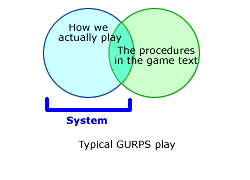
In typical GURPS play, there are a bunch of things you actually do that can't be found in the rulebook, and a bunch of things in the rulebook that you never actually do. System is defined as the things you actually do.
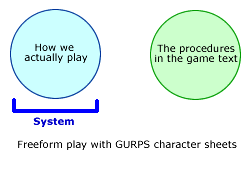
In freeform play, nothing you do can be found in the rulebook, if there even is one. System is defined as the things you actually do.
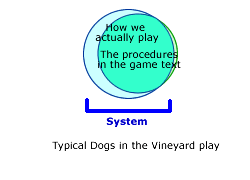
In typical Dogs play, you do practically everything that the rulebook tells you to do, but probably a few things it doesn't. For instance, it gives you no guidance a'tall on how to start and end scenes, but somehow you do start and end scenes. System is defined as the things you actually do.
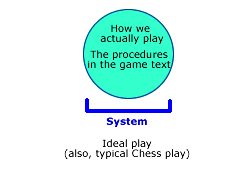
In typical game play, you play by the rules, the whole rules, and nothing but the rules. Is this also the ideal for RPG play? As a designer, I'm torn - maybe this is ideal, maybe the "close enough" of Dogs play is ideal. Either way, typical GURPS play isn't even close.
Here's a little animation showing my own personal experience of Primetime Adventures.
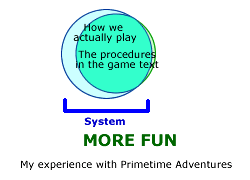
But as you can see, whenever I say system, I mean the things you're actually doing. "System is defined as the process by which you decide what happens in the game." Whatever that process is, that's your system.
But I haven't been saying "system" much these days, have I? I've been saying "rules" a whole lot. I say that the rules in action create a social dynamic. I say that not only needn't rules disrupt immersion, rules can enhance immersion. What do I mean?
Well, consider that the picture of play in my head is the "typical Dogs in the Vineyard" picture, the "more fun" side of the Primetime Adventures picture. What I really mean by "rules" is "the established procedures by which you play." Let's zoom in:
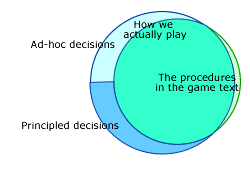
So when we're not using the procedures in the book, we're either making our decisions about what happens on an ad-hoc, once-at-a-time, trial-and-error basis, or on some more established, reliable, principled basis. For instance, in Dogs, you might start scenes differently every time; that'd be ad-hoc. But you might start scenes habitually by the GM saying, "okay, where do you go next?" or "okay, what are you doing?" That'd be principled.
When I say rules, I mean the procedures in the book that you're using, plus the principles you're basing your non-book decisions on.
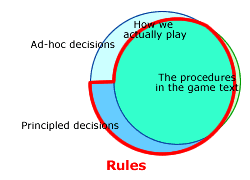
The established procedures by which you play.
This is half of the information you need in order to understand what I'm saying. The other half lives here: How RPG Rules Work.
1. On 2005-06-07, Vincent said:
For completeness' sake:
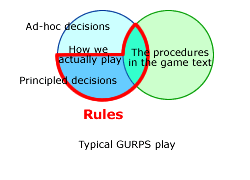
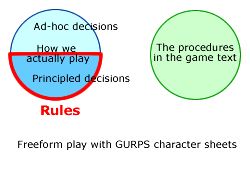
Also, no offence, GURPS. The same holds for Ars Magica, Blue Planet, Call of Cthulhu, Dark Conspiracy, Exalted, FUDGE, Hahlmabrea ...
2. On 2005-06-07, Thor Olavsrud said:
Cool post Vincent! One possible exception to your "more fun" idea though: it is probably only true if the procedures in the game text fall into how we actually play rather than the other way around. I don't think I could have more fun by forcing how I actually play to conform to the procedures in the GURPS text.
3. On 2005-06-07, Shreyas Sampat said:
Nice, Vincent. I particularly like the little animation. It's endearing!
Thor: I think that there is some systematic principle (peculiar to a social context) which selects which procedures become part of system, when no deliberate perturbation of the default applies.
I suspect that this principle tries to maximise the fun output of the rules you select. Depending on how well-informed you are about how rules output fun, this has varying effectiveness, but in the realm of the hundreds of very similar old-school games, I would suspect that many people have well-tuned selection principles.
So, like, yeah. I guess I am implicitly passing judgement on GURPS by saying that. I'm having difficulty verbalising exactly the thing that links my comment to yours, but you are a smart man and I'm sure that you can work it out yourself.
4. On 2005-06-07, Vincent said:
Thor: well, sort of. Here's my experience with Ars Magica:
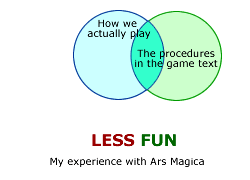
But with a game like Primetime Adventures, playing by the rules is a) more fun than freeforming, but b) not how you'd play by instinct.
That's the value of well-designed rules. They let you do things that are more fun than you'd have without them.
5. On 2005-06-07, Thor Olavsrud said:
Vincent said: "That's the value of well-designed rules. They let you do things that are more fun than you'd have without them."
That I can agree with completely. And Shreyas, I agree with you as well. I just wanted it to be clear that the "more fun" principle works really well when the rules support and enhance the way we actually play, but is not necessarily true when we try to make the way we actually play conform to the way the rules work.
I imagine ideal actual play as a body, in which the text procedures are the skeleton and muscular system. The players (including the GM, of course) are the nervous and circulatory systems that make that body dance.
6. On 2005-06-07, Vincent said:
Here's another variable to consider. Should be obvious how it applies to non-freeform play too:
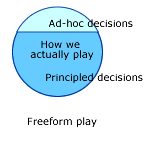 vs.
vs. 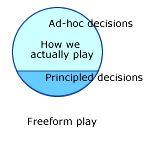
7. On 2005-06-07, Jonas Barka said:
One thought... (feel free to ignore it)
If the game is inherently less fun if the two circles just intersect a bit, do it automatically becomes better if we remove the part of "the procedures in the game text" that we do not use from the game book, using scissors or a black marker?
The result of this on stanard gurps play, as I see it, is something like the Dogs in Vineyard example, but with a smaller "the procedures in the game text" circle. With gurps freeform the circle would be completely gone. And as we do not have to remove the unused parts to ignare them, this would *always* be the case.
This would indicate that what you do not like is a game that do not tell you what to do in it very detailed, but leaves it to the players themselves. Is this the case?
For my own part, a game where the two circles cover each other (ideal game example), where everything you do in the game is covered by the book, feels pointless. A roleplaying game reduced to nothing more than a board game, and a board game with no meta game unaccounted for. I like boardgames, but would not like my game to be like chess. Capes, althou enjoyable, is not a roleplaying game to me, but more of an alternative to boardgames.
Is it possible that a large part of the "personal preference" when it comes to roleplaying lies in how big the "the procedures in the game text" circle is compared to the "how we actually play"? You like it big, and I, prefering a more free form approach, want it small?
/ Jonas
unrealitiesofmine.blogspot.com
8. On 2005-06-07, Vincent said:
Thor, I really don't think it has to do with how closely the procedures in the book match what you're already doing. What it has to do with is just how fun the procedures in the book are. Primetime Adventures is a fun game! Violently wrenching our play style over to match the procedures in the book is totally worth it.
9. On 2005-06-07, anon. said:
Vincent said: "Primetime Adventures is a fun game! Violently wrenching our play style over to match the procedures in the book is totally worth it."
Again, not disagreeing. With the caveat: if that matches up with a way that you WANT to play—whether you realized it before or not. :)
We've actually been seeing this quite a bit on the Burning Wheel boards of late. A few of our newcomers have been playing D&D and nothing else for 25+ years, and picked up Burning Wheel for one reason or another. They are eager and excited and scared about what playing Burning Wheel is going to do to their gaming experiences. The idea of conflict resolution is revolutionary to them. A system that hands author power to mere players if they choose to risk it is incredible. And a system that not only handles dynamic social conflict but makes it exciting and dramatic is completely alien.
They didn't realize those things were missing, although they now see those missing bits as the source of the dissatisfaction they've been having with gaming.
kaomera wrote: "So, the point of all this is: Burning Wheel has made me want to change the way I play (& GM). There is just so much stuff in here that I had always wanted, but never seemed to have the tools to reach. And all I have to do is let go (damnit!!!) of my preconceived notions of how a game should be run."
THAT I can totally support. So I see where you're coming from with your example re: Primetime Adventures.
On the other end of the spectrum is my experience with Exalted. I'm a big fan of wuxia stuff. I dig epic. I'm naturally inclined to allow players to have a potent and dynamic effect on the setting and the story. But I found running Exalted supremely dissatisfying. I love dynamic social conflict. And Exalted's text supports and encourages players to create characters that are tremendously potent in the social arena. You can make a character totally focused on that with magical powers to aid it. Cool!
But when you actually play social conflict, you realize that the system is almost illusory. It's still GM fiat.
hypothetical Exalted situation:
Player: "I convince the entire village to worship me as a god!"
Me: "Cool! Roll for it!"
Player: "I'm using my skill and activating my "Convince Entire Village to Worship Me as a God Charm." I've got 20 gajillion dice. 18 successes! How many do I need?"
Me: "Uh...15 I guess. You...uh...convince 3/4 of them that you're a god. They start eyeing the ones that won't come over and fingering their knives. What do you do?"
In this case, I totally tried to play/run the game as dictated by the text. But it was still unsatisfying.
If I had been using Dogs in the Vineyard instead, the very act of resolution would have made it into a tense dramatic scene. The dice would have dictated the result, but it would have been cool regardless. With Exalted, the resolution wouldn't really matter, I'd just have to eyeball the result and try to come up with a suitable bang that "felt right."
10. On 2005-06-07, Thor Olavsrud said:
Sorry, that was me.
11. On 2005-06-07, Eric Provost said:
Thanks for the pics Vincent. I think I pretty well had a handle on this all before, but the piccies make it easier for me to explain it to my friends that don't spend all their free time studying Forgie things.
-Eric
12. On 2005-06-07, John Harper said:
Thor, you don't like to play Exalted. Which is cool. I don't like to play it either.
Our choices are:
1) Seperate the circles, so that how we actually play is nothing like the Exalted rules, and yet still call what we do "Exalted." I would call this drift (towards freeform).
2) Play a different game (one that we may like to play) and try to get those circles closer together.
I prefer the latter. Is the latter "better"? Based on Vincent's diagram of his (highly successful) Ars Magica game, I think the answer is no.
13. On 2005-06-07, Thor Olavsrud said:
John Harper said: "I prefer the latter. Is the latter "better"? Based on Vincent's diagram of his (highly successful) Ars Magica game, I think the answer is no."
Yep. I think you're absolutely right. And I just want to make it clear that I don't think Exalted is a bad game. It's just a bad game for me, as it doesn't fit neatly into the way I want to play and trying to change my way of playing to suit it just doesn't make for a satisfying experience for me.
In fact, I took a scenario from an Exalted game I ran a few years back that had a lot of promise but just didn't achieve that "zing" in play, and I ran it recently as a one-shot at a nerdnyc event using The Shadow of Yesterday for the rules. And by god that game was awesome.
14. On 2005-06-07, xenopulse said:
Great stuff here, Vincent.
I totally dig the value this has for analysis of freeform play as well. Principled choices in the freeform environments I am used to are things like character ownership and certain social norms with regards to what's valuable input, whereas most conflicts are resolved ad hoc. Gamist-oriented players always try to push for conflict principles, because then they have something substantial to judge competitive activities by; but they frequently become highly frustrated because other people just don't want to agree on principles that diminish their character ownership.
- Christian
15. On 2005-06-08, Ninja Hunter J said:
Xenopulse, I don't find a lack of conflict resolution rules to be a Gamist concern at all. My play tends toward the Narrativist and I prefer rules that separate player from character concerns, and good conflict resolution rules are just that.
16. On 2005-06-08, Tobias said:
Good stuff.
Just one thing: besides RPGs (which I find harder to motivate others for), I play a CCG a lot, and boardgames as well. I play both hard on highly competitive levels and in casual social games.
In both types of games, the circle of 'how we (I) actually play' is always bigger than the procedures in the text. I would suspect it's the same for chess.
How you actually play (and how much fun it is) may be an emergent property of the combination of procedures, social contract, etc. And thus always larger than the procedures.
It's interesting to consider the 'core' aspects in how a player normally 'actually plays for fun' and whether that will match the emergent play from the procedures. It's like every player brings his own set of 'rules' to the table.
I don't think I'm saying anything new here, btw.
17. On 2005-06-08, Shreyas Sampat said:
Tobias, could you give an example, in CCG or boardgame play, of stuff you actually play that's not part of the procedures in the text? I totally believe that this occurs, but my brain is not generating an instance right now, and I think it' be edifying to discuss some.
18. On 2005-06-08, Tobias said:
Sure.
Take Settlers of Catan. Initial town setup is supposedly only based on your own determination of strategic value as well as responding to opponent's placement strategy. Table-talk (pulling the wool over other's eyes, trying to steer others), however, is already majorly into effect at this point. Deviating from the optimal strategy (that you play so often) if it's a low-stakes game is another option. Taking into account the other player's skill (both as a warning, or a sign to relax). All things that are not procedurally mentioned, but they have their effect.
Jokes about how the game is about shoarma/shwarma (a type of food), about your poor sheep being stolen or you having a flock you're unable to unload. Written nowhere, happens a heck of a lot with a lot of different players.
Monopoly's another common example, I guess. I don't know that street trading is mentioned formally anywhere, but many 'it's ok like this' deals happen in Monopoly.
The CCG I play is called Vampire: The Eternal Struggle. It's a cardgame based on an RPG - but there's no roleplaying involved in the game. Often, a player will speak or act 'in character', though (to general amusement).
This what you meant?
19. On 2005-06-08, Brendan said:
A similar example to Tobias's, in the wild:
"During the game of Settlers, Pete got a harbor that gave him two-for-one trades for sheep. The conceit throughout the game was that this was not a harbor for trading sheep for other things, but an offshore sheep rendering plant which produced sheep-fat brick, wooly wood, sheepwheat, and decidedly inferior sheepbone ore."
—Leonard Richardson at http://www.crummy.com/2003/01/07/3
That sounds like ideal play to me.
20. On 2005-06-08, Tobias said:
What, those aren't the regular sheep harbor rules?
;)
That's cool.
21. On 2005-06-08, Vincent said:
That stuff's fun, but no, I'm not talking about the imagined content of play at all. I'm talking very strictly about the procedures of play.
If the sheep harbor has different rules whether you imagine it to be a trade port or an offshore rendering plant, then yeah, that'd count. Exactly like Monopoly house rules, yes.
I don't know anybody who seriously has house rules for chess, though. "Bishops can move a maximum of four spaces," that kind of thing.
22. On 2005-06-08, Shreyas Sampat said:
Hm. Some of it is and some of it isn't. I'm more interested in the forms of unwritten behavior that are clearly principled (pulling the wool over other's eyes, trying to steer others, [t]aking into account the other player's skill) than, like, sheep blubber as a building material.
23. On 2005-06-08, xenopulse said:
Ninja,
Bad choice of words on my side there. I meant principles for judging freeform fights between characters, not actual conflict resolution systems. I.e., whoever describes more innovative moves wins, or whoever describes more powerful attacks wins, etc.
- Christian
24. On 2005-06-08, Matt Wilson said:
I bet a lot of people who play chess don't use the timers that you see in the big tournaments. I've never used one. Does that qualify as a house rule?
25. On 2005-06-08, Vincent said:
Matt, good question about the chess timers.
Anyhow, that's the least interesting picture in the lot, the "ideal play" one.
What I want is confirmation that everyone gets that when I say rules, as in "the rules create a social dynamic" or "rules can contribute to immersion," I'm talking about the red outline. The stuff we actually do that's principled, whether it comes from some game text or not.
Christian: "Principled choices in the freeform environments I am used to are things like character ownership and certain social norms with regards to what's valuable input..."
Exactly. Freeform play might have just as many rules as by-the-book play, especially if the freeform play is based on solid underlying principles. (With me, Jonas?)
26. On 2005-06-08, Ben Lehman said:
I think that there needs to be an expansion on "how we actually play" to include rules which are never actually invoked, but yet still of import or not include them. Like, if we are playing Riddle of Steel, and we never actually use the combat rules, they can still *matter* for play, 'cause they are very different than most other games and how you act around an armored man is just going to be a different thing.
Can we separate "rules we never use, but would if we could" from "rules that we never use, and wouldn't use ever?" How?
yrs—
—Ben
27. On 2005-06-08, Vincent said:
Ben, that sounds like a principled decision to me.
28. On 2005-06-08, Thor Olavsrud said:
Vincent said: "I don't know anybody who seriously has house rules for chess, though. "Bishops can move a maximum of four spaces," that kind of thing."
There are some.
Bobby Fischer Random Chess
is an example, even if it is the product of insanity.
29. On 2005-06-08, Neel said:
Oh there are house rules for chess all over the place. As Matt notes, there's speed chess, and then there's also giving up pieces to equalize things for players of different skill levels, etc.
Also, another example for a Magic game might be a consensus to avoid blue(?) decks—IIRC, that's the color that contains a bunch of countermagic effects, so that the net effect of playing one is that neither you nor your opponent ever do anything flashy.
Finally, Vincent, I think that one of the weird things about rpgs is that the imagined content of play can be part of the form of the rules. So, if you're playing radioactive gunslingers wandering a postapocalyptic wasteland, then one PC obviously can't file a lawsuit against another. There's a feedback between imagined stuff and rules procedures, to the point that the line between them is blurry at best.
30. On 2005-06-08, Vincent said:
Okay, maybe this is tricky, but it's not trivial. "[O]ne PC obviously can't file a lawsuit against another" isn't part of the procedures of play.
"One player can't insist that his PC files a lawsuit against another PC" [i]is[/i] part of the procedures of play, though. What I hope you'll notice is this: "don't have your character do something outside the preagreed bounds of the game" is a procedure of play, the line between it and the imagined stuff isn't blurry at all, and it's clearly a principled decision (whether it comes from a rulebook or not).
The line between the rules and the imagined stuff only seems blurry if you also blur the line between the players and the imaginary stuff. As always, the rules of the game apply to the players only.
31. On 2005-06-08, xenopulse said:
I think the line is blurry in any given group insofar as the principles have not been explicitly agreed upon. And when you have a setting, not everyone shares all of the implicated conventions/principles of that setting. Some of the principles are then negotiated during play, when ad hoc decisions become adopted.
- Christian
32. On 2005-06-08, Neel said:
Vincent: I think they're actually, genuinely interdependent. The rules are how the players come to an agreement about what happens in the narrative, and if the procedure that the players to decide what happens references the imaginary stuff, then the imaginary stuff helps form the procedures of play.
Eg, if the characters are in a big city (an imaginary fact), then a player may have her PC files a lawsuit (the player doing something real that changes the imaginary setting). Conversely, if the characters are in the Amazon (a different imaginary fact), then that same player cannot say that her PC files a lawsuit. The procedures of play—what is and isn't acceptable to the players—depend upon the imaginary stuff.
Clearly, you can say this is an instance of the non-dependent rule "don't have your character do stuff outside the preagreed bounds (of theme, causality, tone, whatever)", but I don't want to do that because it squashes a lot of distinctions that are important to me into a single pile—what I'm interested in is precisely the interplay of the fiction and the actuality.
33. On 2005-06-08, Vincent said:
Neel: Interdependent, yes, no doubt. Interplay, absolutely. Blurry, no.
34. On 2005-06-08, Vincent said:
Oh, here I am being all snappy.
What I really mean is that at this level of discussion:

At this level of discussion, the fictional stuff doesn't appear, and can't. It's at this level of discussion:

It's at this level of discussion that we can talk about the fictional stuff.
35. On 2005-06-08, Jason Petrasko said:
... Vincent, I was able to clearly follow your diagrams until the fictional stuff one... SIS, Players, and Mechanics? or What? @.@
36. On 2005-06-08, Charles said:
Vincent,
While fictional stuff doesn't appear directly in the first diagram, there are two ways that it ties into that first diagram very strongly.
1) If we actually filled in the details of that diagram for a specific game, the fictional stuff would appear to the extent that the fictional stuff is part of the rules. Rules concerning the use of slayer powers would appear if we were detailing a Buffy game, but not if we were detailing a Dogs game.
2) In a related manner, the decisions about what rules to use will be influenced as much by fictional concerns as they will by player interests. While player concerns are very important in deciding what rules to use (Exalted didn't work for Thor, or AM for you or me, not because they didn't fit the fictional world, but because they didn't fit our play styles), fictional concerns are also extremely important. If you were playing D&D and got interested in playing court politics in the game, you would quickly find that D&D didn't do court politics very well, and you'd probably start jettisoning the written rules. Likewise, if your game of Breaking the Ice turned into a dungeon crawl, the Breaking the Ice rules probably wouldn't help very much and would get jettisoned.
I suppose you could describe both of those situations as being a failure of the rules to provide the style of play the players wanted (leaving out the fictional stuff from the description), but it seems to me that this elides the big distinction between "I want to run an Exalted-like game, but the Exalted rules don't do it for me," and "I don't think Breaking the Ice works very well for dungeon crawls." A player who enjoys both Breaking the Ice and D&D for their appropriate subject matter is in a different position than a player who just doesn't like Exalted.
Perhaps what you need is a diagram showing the interplay between the top diagram and the bottom diagram, showing how the bottom diagram has fingers that extend up into the top diagram (or at least into the penumbra around the top diagram that controls the feedback loops that allow the top diagramed structures to evolve).
But yes, the distinction between "game text" and "how we play", with "how we play" being the system, no matter how closely it resembles the game text, nor how completely lacking in game text we are, I totally agree on, and I think the distinction between ad hoc and principled is also useful.
I do think there is a significant blur between ad hoc and principled decision making, with a lot of "well, generally we'd handle that like this, but right now lets handle it like this instead" overlapping between the two, but as long as that blur is taken as read, I think the distinction is a useful one.
37. On 2005-06-08, Charles said:
38. On 2005-06-08, Jason Petrasko said:
Charles, Thanks!
*slaps forehead*
*makes mental note to follow bold text with link next time*
39. On 2005-06-08, Emily Care said:
The reason why the fiction doesn't figure in the venn diagram is because it's right there along with all the other rules from the text and decisions by the people. It is not separate. As Charles said, the fiction is rules. They are cues or creative constraints like everything else.
Perhaps what you need is a diagram showing the interplay between the top diagram and the bottom diagram, showing how the bottom diagram has fingers that extend up into the top diagram (or at least into the penumbra around the top diagram that controls the feedback loops that allow the top diagramed structures to evolve).
Ben's post Big Model+ hits some of this. It addresses the interplay between the actual moments of play with the techniques chosen & social & creative agendas interacting with them. What Vincent is describing with his exhilaration of venn diagrams is the process by which folks make the decisions they do. The ephemera level is all the decisions (narrations, etc) actually made. The agenda level underlies and/or arises from the other. Actually, now that I think about it, both of Vincent's diagrams are of the ephemera level, just looked at in different ways.
Aside: the amusing thing is that breaking the ice could function perfectly well for a dungeon crawl—(your conflict is that you've got a crazy mage who wants you dead, my character's is that she's been cursed to turn into a kobold when she gets scared)—just so long as two of the characters are falling in love. The overall conflict is the romance, the intervening events could be anything. But then, that might not work for everyone, of course.
40. On 2005-06-15, ScottM said:
Just so you know, your link to "How RPG Rules Work" is now broken. (It currently links to http://www.lumpley.com/archive/156.html, which gives you a 404 Not found.) I tried idiot substitutions (cutting out "archive", etc.), but didn't come across the right article. Hopefully there's an easy fix, since I suspect this will affect all of your interlinked posts.
41. On 2005-06-15, Vincent said:
Fixed. Not a graceful fix, but a fix.
RSS feed: new comments to this thread
This thread is closed to new comments.
home: anyway.
newer thread: 2005-06-14 : As Of Now
older thread: 2005-06-06 : Immersion, Rewrite



















